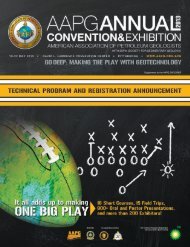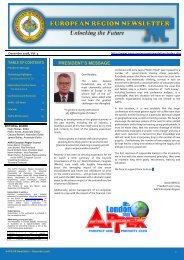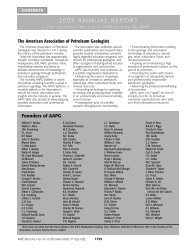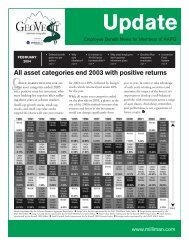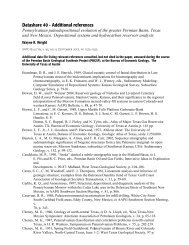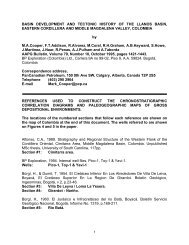AAPG Explorer - June 2010 - American Association of Petroleum ...
AAPG Explorer - June 2010 - American Association of Petroleum ...
AAPG Explorer - June 2010 - American Association of Petroleum ...
You also want an ePaper? Increase the reach of your titles
YUMPU automatically turns print PDFs into web optimized ePapers that Google loves.
WWWUPDATE<br />
A new design gives the <strong>AAPG</strong> website a specific look for all Regions <strong>of</strong> the world.<br />
Regions Get New Focus on Website<br />
By JANET BRISTER, <strong>AAPG</strong> Website Editor<br />
Location, location, location.<br />
Depending on where in the<br />
world you’re standing – or sitting,<br />
or whatever position you’re in when you<br />
access www.aapg.org – your view <strong>of</strong> the<br />
<strong>AAPG</strong> website is different.<br />
Your <strong>AAPG</strong> Web team has tapped into<br />
GeoIP technology and added a banner<br />
to the <strong>AAPG</strong> home page that will display<br />
a specific <strong>AAPG</strong> Region link to your<br />
computer.<br />
If you’re in the United States, nothing<br />
will change for your <strong>AAPG</strong> home page.<br />
But if you’re in, say, India, you’ll see a<br />
banner across the top <strong>of</strong> the home page<br />
that is focused on the Asia-Pacific region.<br />
Simultaneously, members in, say, Italy<br />
see one that provides Europe region<br />
information, while in Brazil they are<br />
looking at one focused on Latin America.<br />
Wherever you are in the world – Africa,<br />
Canada, the Middle East, etc. – your<br />
computer will have a banner linking your<br />
computer to that Region.<br />
This feature allows for more obvious<br />
navigation to the Region areas on the site<br />
and gives a more prominent, local focus<br />
to member activities over the globe.<br />
* * *<br />
How is this possible?<br />
This is based on your computer’s<br />
address that is given to it by the Internet<br />
Service Provider (ISP) hosting the<br />
services you are using.<br />
So if you are a world traveler and<br />
started your day in London, England, but<br />
Continued from previous page<br />
Tearpock, J.G. Chapman, A.W. Cherry)<br />
Japan<br />
Ito, Makoto, Chiba University, Chiba (S.<br />
Yoshida, M. Fujiwara, Y. Yaguchi)<br />
Kuwait<br />
Al-Shemali, Adnan Aiesh, Kuwait Oil Co.,<br />
Ahmadi (R.M. Zereik, K. Ahmed, S.S. Thakur)<br />
Netherlands<br />
Herrero-Fernandez, Maria J., University<br />
Complutense Madrid, Delft (R.R. Gries, A.<br />
Moscariello, A. Permanyer)<br />
Nigeria<br />
Kelsch, Kenneth, Chevron, Lekki (H. Xiao,<br />
that evening was spent in New York City,<br />
the <strong>AAPG</strong> website you saw that morning<br />
will look different from what you see that<br />
evening.<br />
It’s pretty simple really. Just think <strong>of</strong><br />
your telephone.<br />
The telephone number consists <strong>of</strong><br />
country codes and area codes and local<br />
exchanges. Similarly, the IP addresses<br />
are organized into sets within countries<br />
and geographic areas.<br />
But here’s where the technology<br />
changes. Telephones didn’t usually<br />
travel, so the number was as stationary<br />
as the house address. Now, even though<br />
the phone travels, the number affiliated<br />
with that phones does not change.<br />
When you are accessing the<br />
Internet, whatever device you are using<br />
is assigned an IP address managed<br />
through the local ISP. These are really<br />
long numbers (up to 12 digits) that<br />
reflect the geographic location <strong>of</strong> the ISP<br />
through which you are obtaining your<br />
services.<br />
When you travel and use Internet<br />
services provided within that area, the<br />
IP reflects your location. These ISPs<br />
are very cooperative. They negotiate<br />
connections and verification in order to<br />
pass through e-mails and other data,<br />
using all kinds <strong>of</strong> different protocols.<br />
Tapping into that organization is how<br />
<strong>AAPG</strong> now serves up this new areaspecific<br />
version.<br />
So wherever you are …<br />
Good browsing!<br />
C.F. Kluth, T.L. Heidrick); Tiamiyu, Abimbade<br />
Ishola, Mosunmolu Limited, Lagos (O.S.<br />
Adegoke, A.A. Adesida, O.A. Olawoki)<br />
Norway<br />
Moore, David John, self-employed, Oslo (N.<br />
Piggott, G.T. Himes, L.N. Kaye)<br />
Pakistan<br />
Rafi, Salma, University <strong>of</strong> Karachi, Karachi<br />
(T.S. Hasany, M.Z. Khan, N.K. Siddiqui)<br />
Saudi Arabia<br />
Ternes, David L., Saudi Aramco, Dhahran<br />
(S.R. Wharton, D.P. Taylor, G.E. Jahraus)<br />
Scotland<br />
Unger, Mike, Chevron Upstream Europe,<br />
Aberdeen (R.W. Blake, S.A. Haas, D. Morgan)<br />
<strong>AAPG</strong><br />
EXPLORER<br />
WWW.<strong>AAPG</strong>.ORG JUNE <strong>2010</strong><br />
49




